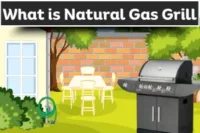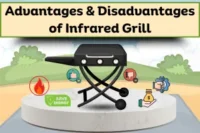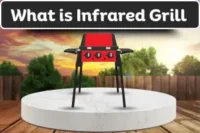Advantages and Disadvantages of Gas Grill – Complete Guide
Published: 7 Sep 2025
Outdoor cooking gets easier with gas grills. They light up in seconds and cook food evenly. But every grill has its pros and cons. Understanding the advantages and disadvantages of gas grill can save you time, money, and effort. This guide explains the main benefits and drawbacks in a simple, easy-to-read way for anyone who loves grilling.
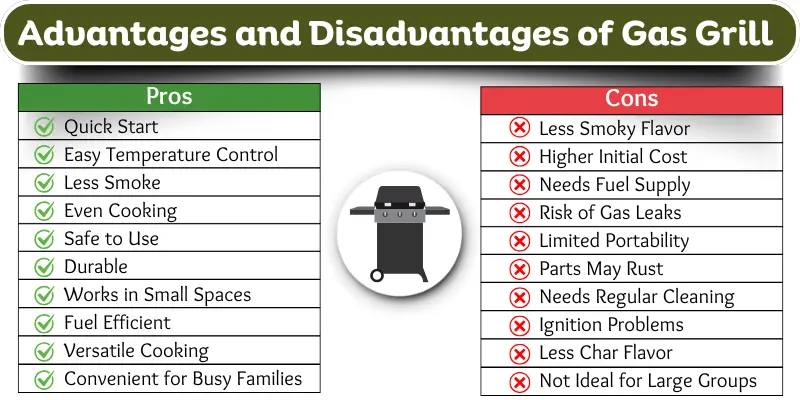
What are the Advantages and Disadvantages of Gas Grill?
Gas grills are a favorite for many backyard cooks. They heat up fast and are easy to use. You can cook meals quickly without much hassle. But they also have some downsides, like less smoky flavor and regular maintenance. Let’s see the main pros and cons.
Advantages of Gas Grill
Gas grills make outdoor cooking simple and fun. They save time and give consistent results. Many people love them for their convenience and ease.
Here is a quick list of the benefits of using a gas grill.
- Quick Start
- Easy Temperature Control
- Less Smoke
- Even Cooking
- Safe to Use
- Durable
- Works in Small Spaces
- Fuel Efficient
- Versatile Cooking
- Convenient for Busy Families
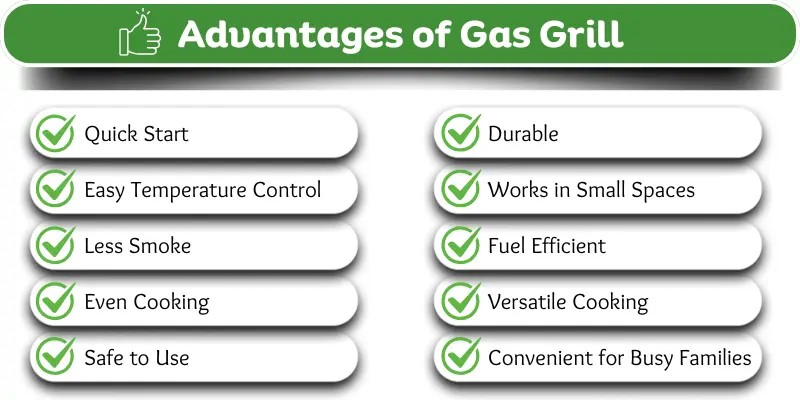
Quick Start
Gas grills light up in seconds. You don’t need matches or waiting for coals. Just turn the knob and ignite the flame. This quick start makes cooking faster and easier, especially for busy weeknights or last-minute BBQs.
Easy Temperature Control
Gas grills let you control heat with a simple turn of a knob. You can set high heat for searing or low heat for slow cooking. This makes grilling precise and predictable. It helps you cook meat and veggies perfectly every time.
Less Smoke
Gas grills produce very little smoke while cooking. You don’t need to worry about thick smoke in your backyard. This makes them perfect for patios or small outdoor spaces. You can enjoy grilling without bothering neighbors or setting off smoke alarms.
Even Cooking
Gas grills heat the food evenly on all sides. You don’t get burnt spots or raw patches. This helps meat, veggies, and fish cook perfectly every time. Even cooking makes your meals tasty and consistent.
Safe to Use
Gas grills are very safe to use. You don’t need to handle hot coals or open flames. Most grills have safety features like automatic shut-off. This makes grilling easier and reduces the risk of accidents.
Durable
Gas grills are built to last for years. They use strong materials like stainless steel. You can grill often without worrying about damage. A durable grill gives you reliable performance every time you cook.
Works in Small Spaces
Gas grills fit well in small spaces like patios and balconies. You don’t need a big backyard to enjoy grilling. They are compact but still cook meals evenly. Small grills let you enjoy BBQ anytime, even in limited areas.
Fuel Efficient
Gas grills use fuel efficiently. They heat up quickly and require less gas than other grills. This saves money and makes grilling more convenient. Fuel efficiency lets you cook multiple meals without refilling often.
Versatile Cooking
Gas grills let you cook many types of food. You can grill, sear, roast, or even bake. This flexibility makes them perfect for different meals. Versatile cooking helps you enjoy a variety of flavors anytime.
Convenient for Busy Families
Gas grills save time for busy families. They heat up fast and cook food evenly. You can prepare meals quickly without stress. This convenience makes backyard cooking simple and enjoyable for everyone.
Disadvantages of Gas Grill
Gas grills are convenient, but they are not perfect. They have some limitations you should know. Understanding these disadvantages helps you make a better choice for your backyard cooking.
Below is a simple list of the cons of a gas grill.
- Less Smoky Flavor
- Higher Initial Cost
- Needs Fuel Supply
- Risk of Gas Leaks
- Limited Portability
- Parts May Rust
- Needs Regular Cleaning
- Ignition Problems
- Less Char Flavor
- Not Ideal for Large Groups
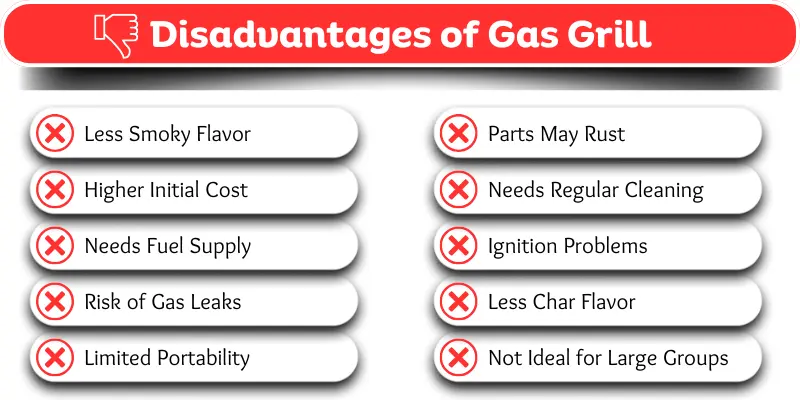
Less Smoky Flavor
Gas grills don’t give the same smoky taste as charcoal grills. You miss the strong BBQ flavor in some dishes. This can be a downside for flavor lovers. You may need extra tools, like smoker boxes, to add smoke.
Higher Initial Cost
Gas grills cost more to buy than some other grills. The initial price can be high for big, quality models. You invest more upfront, but get convenience and durability in return. Budgeting helps you pick the right grill without surprises.
Needs Fuel Supply
Gas grills need a constant fuel supply to work. You must refill propane tanks or connect to natural gas. Running out of fuel can interrupt cooking. This makes planning ahead important for every BBQ.
Risk of Gas Leaks
Gas grills use propane or natural gas, which can leak if not handled properly. A gas leak is dangerous and can cause accidents. Regular checks and proper connections keep you safe. Always follow safety instructions when using your grill.
Limited Portability
Gas grills can be heavy and bulky. They are not easy to move around like small charcoal grills. You may need help to reposition them. Limited portability can be a challenge for outdoor events or trips.
Parts May Rust
Some gas grill parts can rust over time. Exposure to rain or humidity can damage metal surfaces. Regular cleaning and covering your grill helps prevent rust. Proper care keeps your grill working longer.
Needs Regular Cleaning
Gas grills need regular cleaning to work well. Grease and food particles can build up quickly. Cleaning burners and trays prevents clogs and bad odors. Regular care keeps your grill safe and efficient.
Ignition Problems
Sometimes gas grills fail to ignite properly. The spark system or burner may not work. This can stop your cooking suddenly. Regular checks and maintenance help avoid ignition problems.
Less Char Flavor
Gas grills don’t give the same char taste as charcoal grills. You may miss the smoky, grilled flavor in some dishes. This can affect steaks and burgers. Using a smoker box can help add some extra flavor.
Not Ideal for Large Groups
Small and medium gas grills cook a limited food at once. This can be a problem for big gatherings. You may need multiple grills to serve everyone. Planning ahead helps you feed large groups without stress.
Conclusion
So, guys, now let’s wrap up this topic. We have explored the advantages and disadvantages of gas grill in detail. Gas grills are fast, safe, and convenient. But they may lack smoky flavor and need fuel. Choose the right grill for your space and cooking style. Pick your perfect grill today and enjoy hassle-free backyard meals!
FAQs
Grilling can be simple if you know the right tips. Here are some common questions beginners ask about the advantages and disadvantages of a gas grill. These answers will help you grill smarter and safer.
Gas grills heat up quickly and cook food evenly. They are easy to start with just a knob. You can control the temperature easily. They also produce less smoke. Many people find them safe and convenient for backyard cooking.
Gas grills may not give a smoky flavor like charcoal grills. They require propane or natural gas. Some parts may rust over time. Big grills are not easy to move. You also need regular cleaning and maintenance.
Yes, gas grills are generally safe. They don’t use hot coals like charcoal grills. Most models have safety features like an automatic shut-off. Still, you should check for gas leaks and follow instructions. Safety comes first while grilling.
Yes, many gas grills fit patios, balconies, and small yards. Compact models cook food evenly. They are ideal for apartments or limited backyard areas. You can enjoy BBQ anytime without needing a large space.
Yes, gas grills are fuel-efficient. They heat up fast and use less gas than other grills. This saves money over time. You can cook multiple meals without refilling frequently. Fuel efficiency is a big advantage.
You should clean your grill after 3–4 uses. Remove grease, food residue, and ash from trays and burners. Regular cleaning prevents rust and ignition problems. A clean grill also improves taste and safety.
Gas grills don’t naturally give strong smoky flavor. But you can add wood chips or smoker boxes. This creates extra flavor for meats and vegetables. You get a taste closer to traditional BBQ without charcoal.
Small or medium gas grills cook limited food at once. They may not be enough for big gatherings. You might need multiple grills for large groups. Planning ahead helps serve everyone without stress.
Gas grills last many years if maintained properly. Durable materials like stainless steel prevent rust. Regular cleaning and covering your grill increase lifespan. Proper care ensures you enjoy safe, consistent cooking.

- Be Respectful
- Stay Relevant
- Stay Positive
- True Feedback
- Encourage Discussion
- Avoid Spamming
- No Fake News
- Don't Copy-Paste
- No Personal Attacks



- Be Respectful
- Stay Relevant
- Stay Positive
- True Feedback
- Encourage Discussion
- Avoid Spamming
- No Fake News
- Don't Copy-Paste
- No Personal Attacks
